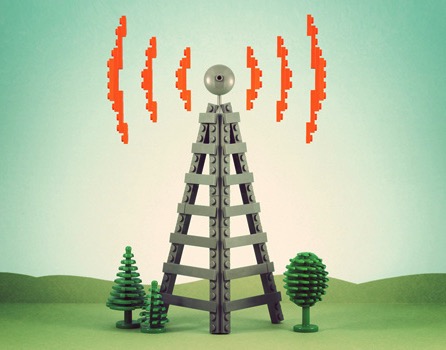2.4 GHz – The Ideal Unlicensed Spectrum for Long-Range IoT Networking (Part I)
 Which frequency is it best to operate in?
Which frequency is it best to operate in?
Good question, but this is not always easy to answer. Choosing where in the radio frequency spectrum to build a new technology has many implications for cost, performance, global availability and more.
Licensed vs. Unlicensed Spectrum
Licensed spectrum is a very valuable and scarce resource. Through auctions, lobbying and various other methods, national governments allocate licenses for a wide range of uses. Because of this, licensed spectrum is a very expensive resource. For cellular communications, it is estimated that 40% of the total cost of building a network is the cost of the spectrum required. The high value of spectrum is a key reason why cellular operators are constantly migrating to newer technologies (also known as sun-setting of obsolete networks or re-farming spectrum). With the constantly increasing demand for bandwidth from smart phones, tablets and streaming video, it is critical that they move to the highest revenue use for this limited, expensive asset.
Unlicensed spectrum provides an alternative, with specific areas set aside for all users who follow a set of rules designed to ensure that many devices can operate in these shared radio frequencies. For wide-area communications, the primary unlicensed bands used are 900 MHz (868 in Europe, 915 in the US) and 2.4 GHz. Technologies that can operate successfully under the rules of these frequency bands can go to market quickly and avoid the huge costs of licensed spectrum – in fact even the cellular industry is beginning to test the unlicensed spectrum (Wi-Fi, call hand-off, LTE-U) to limit their spectrum costs.
 Our patented RPMA (Random Phase Multiple Access) technology has been specifically designed to deliver high-performance in unlicensed spectrum, with key characteristics such as reliable operation even in high interference environments (tolerance for up to 50% packet error rates) and robustness vs. high intensity burst interference.
Our patented RPMA (Random Phase Multiple Access) technology has been specifically designed to deliver high-performance in unlicensed spectrum, with key characteristics such as reliable operation even in high interference environments (tolerance for up to 50% packet error rates) and robustness vs. high intensity burst interference.
(Stay tuned for next week’s continuation of this article!)
On-Ramp Wireless and Meterlinq Deploy IoT Network in Italy
Wide-area RPMA network will provide connectivity for industrial applications throughout Italy
PADOVA, ITALY and SAN DIEGO – June 24, 2015 — On-Ramp Wireless, the leading provider of long-range connectivity for the Internet of Things (IoT), today announced it has partnered with MeterLinq srl, a provider of secure telemetry and remote-management infrastructure for smart metering and smart grid services, to deploy the first wide-area IoT network in Italy. The network, initially built for Italy’s leading natural gas operator Amgas, will provide connectivity for smart metering of natural gas and other industrial applications throughout the region.
On-Ramp Wireless and WellAware Complete Large-Scale Communications Network to Enable the Digital Oilfield
Low-Power, Wide-Area Connectivity Provides Unique Advantages for Automation and Security in Oil and Gas Operations
SAN DIEGO and SAN ANTONIO – May 21, 2015 – On-Ramp Wireless, the leading provider of long-range connectivity for the Internet of Things (IoT), and WellAware, the oil and gas industry’s only full-stack solution for oilfield monitoring and optimization, today announced their collaboration on the creation of a wide-area IoT communications network. With this network, WellAware and On-Ramp Wireless provide coverage for over 55,000 square miles of the most active US oil and gas fields, representing more than 50 percent of total US production.
On-Ramp Wireless Expands Internet of Things (IoT) Connectivity With Over 30 Global Network Deployments
Company Attains 200 Percent Annual Growth Driven by Ground-Breaking, Low-Power, Long-Range RPMA Network Technology
SAN DIEGO – April 14, 2015 – On-Ramp Wireless, the leading provider of long-range connectivity for the Internet of Things (IoT), today announced several key 2014 milestones in the adoption of low-power, wide-area communications. Driven by critical infrastructure applications such as smart grid, intelligent lighting, advanced metering infrastructure (AMI) and oil and gas automation, the company’s customers and partners substantially accelerated network deployments — reaching 30 deployed networks in 2014, a 200 percent increase over year-end 2013.
On-Ramp Wireless to Showcase Connectivity Solutions for Grid Edge, AMI and Other Utility Applications at DistribuTECH Conference and Exhibition
SAN DIEGO – January 27, 2015 – On-Ramp Wireless, a leading provider of wireless communications solutions for the Industrial Internet of Things (IIoT), will be highlighting its smart grid communication solutions at the DistribuTECH Conference and Exhibition in Booth #1007, taking place February 3-5 at the San Diego Convention Center in San Diego, California.
On-Ramp Wireless Receives Top Recognition in Fierce Innovation Awards: Energy Edition
Company recognized for leadership in Communications for its Total Reach Network, also takes “Best in Show” honors
SAN DIEGO – October 2, 2013 – On-Ramp Wireless, developer of wireless solutions for energy automation and M2M communications, announced today that it has been recognized by this year’s Fierce Innovation Awards: Energy Edition, a unique industry awards program powered by the publishers of FierceEnergy and FierceSmartGrid. On-Ramp Wireless received top honors in the “Communications” category, as well as an overall award of “Best in Show: Most Efficient Cost Saver,” for its innovative, industry-leading Total Reach Network.
Recent Posts
Archives
Current Month
february, 2026
No Events
Tags
2.4 GHz
2.4 GHz Spectrum
2.4GHz Spectrum
2G sunset
Agriculture
asset tracking
battery life
capacity
Cities
congestion management
coverage
digital oilfield
environmental monitoring
Events
Glossary
Hardware Integration
How RPMA Works
IoT
ISM Band
LoRa
LPWA
LTE-M
Machine Network
Network Longevity
precision agriculture
PRMA vs Competition
rpma
RPMA Technology
RPMA vs Competition
security
sigfox
smart city
smart grid
Software Integration
Solution Partners
Unlicensed Spectrum
value


 Which frequency is it best to operate in?
Which frequency is it best to operate in?
